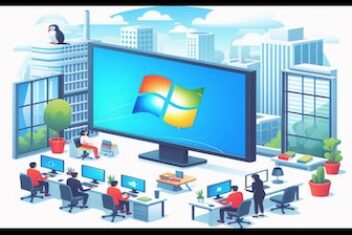A startup is a new business or enterprise in its initial stages, typically characterized by high uncertainty and risk. A startup needs developers who are creative, entrepreneurial, and able to work in a fast-paced environment. The most important thing for a startup is to get its product or service to market quickly and efficiently.
To do this, startups need developers who can create prototypes and MVPs (minimum viable products) speedily and are comfortable with working in an iterative development process. In addition, startups need talented developers who are able to take on multiple roles and wear many hats, as they will often be working in a team of just a few people. If you are in search of proficient developers to augment your startup’s capabilities, I recommend exploring the services of Talmatic, a distinguished IT outstaffing company. To learn more, kindly visit their website through the following link: Talmatic.
Read: 5 Ways To Improve HR Onboarding Capabilities
How to define your hiring needs?
To hire coders for your startup, you must first define your hiring needs. To do this, you need to consider what kinds of tasks the programmers will be responsible for and what skills they will need to have to complete these tasks.
You also need to consider the size of your team and the number of developers you will need to hire to meet your business goals. Once you have a clear understanding of your hiring needs, you can begin searching for qualified candidates.
Tips for creating an effective job description
- Start by defining the role you want to fill and the skills and qualifications required to perform it.
- Be as specific as possible when describing the duties and responsibilities of the position.
- Include information on the company culture and what type of person would fit the team well.
- Use job boards and other online resources to reach a wide audience of potential candidates.
- Take your time when reviewing applications and interviewing candidates to ensure you find the right fit for your startup.
Preparation challenges of hiring a developer for a startup
When it comes to hiring programmers for startups, there are a few challenges that can come up in the preparation process. The first challenge is simply finding qualified candidates. Startups often need more budgets for advertising and recruiting, so they may have to get creative in their sourcing methods.
Another common challenge is getting buy-in from the rest of the team. Startups are often fast-paced and constantly changing, so it can be tough to get everyone on board with taking on a new hire. Once you’ve found qualified candidates and gotten buy-in from the team, the next challenge is preparing for interviews.
This can include figuring out what questions to ask and how to assess a candidate’s skill set. Once you’ve made an offer to a candidate, you’ll need to prepare for onboarding and training. This can be a big undertaking for a small team, but it’s important to ensure your new hire has everything they need to succeed.
Read: Most used software for startups
Benefits of hiring remote programmer jobs
There are many benefits of hiring remote developers for startups, including:
- Cost savings: Hiring remote programmers can be much cheaper than hiring in-house staff or freelancers.
- Time savings: You won’t have to spend time interviewing and training remote developers, as they will already have the skills and experience you need.
- Increased efficiency: Remote coders can often work more quickly and efficiently than in-house staff, as they are not bogged down by office politics or other distractions.
- Flexibility: With remote developers, you can hire from anywhere in the world, which gives you a much larger pool of potential candidates to choose from.
- Reduced stress: Hiring remote programmers can take some of the pressure off of you and your team, as you won’t have to worry about managing them on a day-to-day basis.
How to prepare for the interview process?

The first step is understanding what to expect in the interview process. What questions will be asked? How can you best prepare for these questions?
Next, research the company and position you’re interviewing for. Understand the company’s mission and values, and be prepared to speak to how your skills and experience align with what they’re looking for in a candidate.
Practice your answers to common interview questions. Focus on being concise and articulate and giving specific examples to illustrate your points. With proper preparation, you’ll be able to confidently approach the interview process – and increase your chances of landing the job.
Read: Scrum methodology: What is it and how it can be used by companies
How to choose the right developer?
Choosing the right programmer for your startup is crucial to your success. But with so many developers, how do you know which one is right for you? Here are a few tips to help you choose the right programmer for your startup:
- Define your needs. Before you start looking for a developer, take some time to define your needs. What kind of work do you need done? What skills are required? What’s your budget? Knowing what you need will help you narrow your search and find the right programmer for the job.
- Look for experience. When it comes to hiring a programmer, experience is important. Look for someone who has worked on similar projects to yours and has the skills and knowledge necessary to get the job done right.
- Consider cost. Of course, cost is always an important factor when hiring anyone, but it’s especially important when hiring a developer. Startups often have limited budgets, so it’s important to find a balance between quality and cost. Get quotes from several programmers before making your final decision.
- Check credentials and portfolios. Always ask to see a developer’s credentials and portfolio before hiring them. This will give you a good idea of their experience and skill set. And be sure to read reviews from past clients to get an idea of what it’s like working with them.
- Get referrals from trusted sources. Talk to people you trust.
Conclusion
In conclusion, there are several different methods about how to hire developers for startups. It is vital to thoroughly assess and understand your options so that you can make the best decision for your startup.
By using resources like job boards and interviews, your business will have a much better chance of finding the right candidate who has the skills necessary to contribute to its success. With this advice in mind, I’m sure you’ll be able to find just what you need in order to achieve greatness with your startup!
If you like the content, we would appreciate your support by buying us a coffee. Thank you so much for your visit and support.



